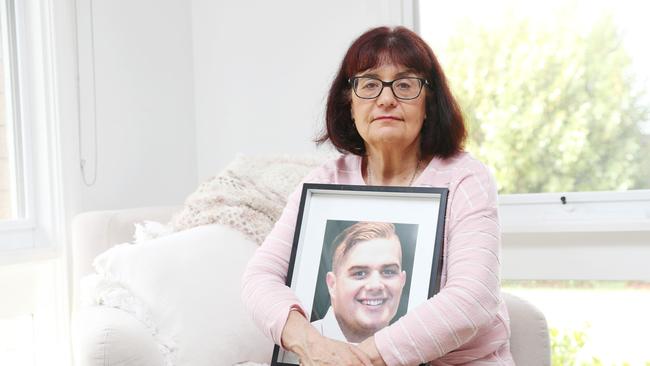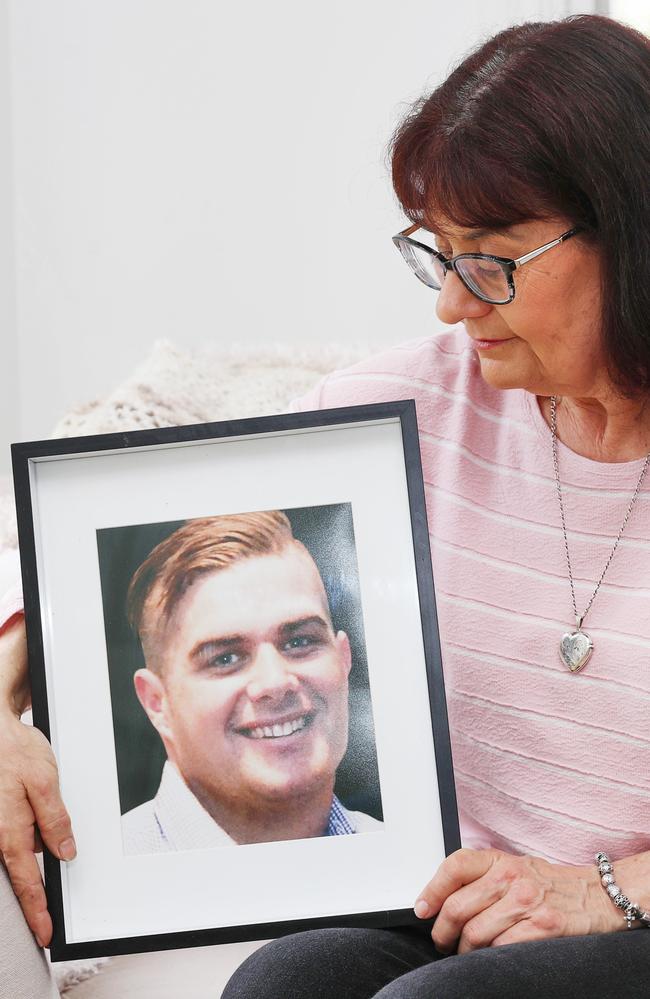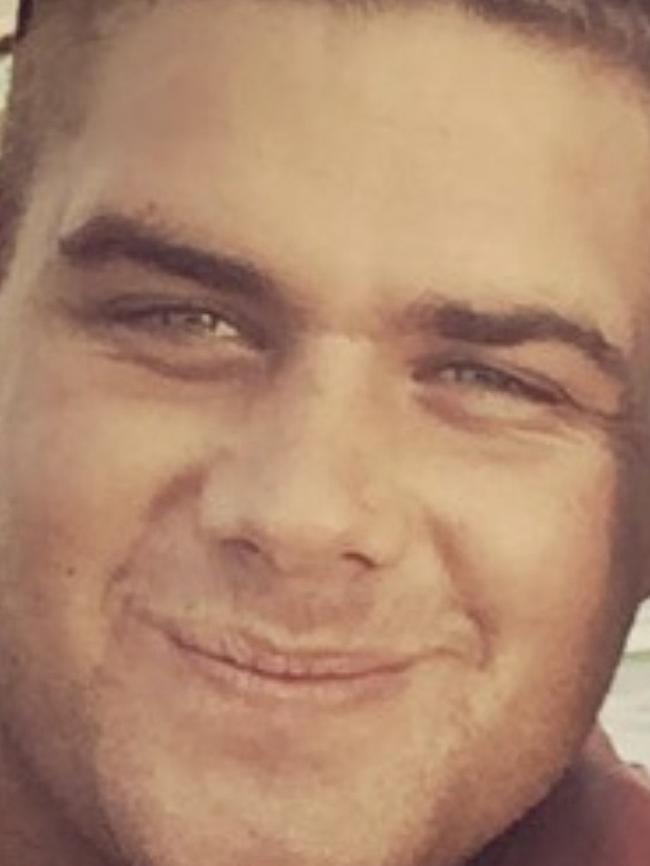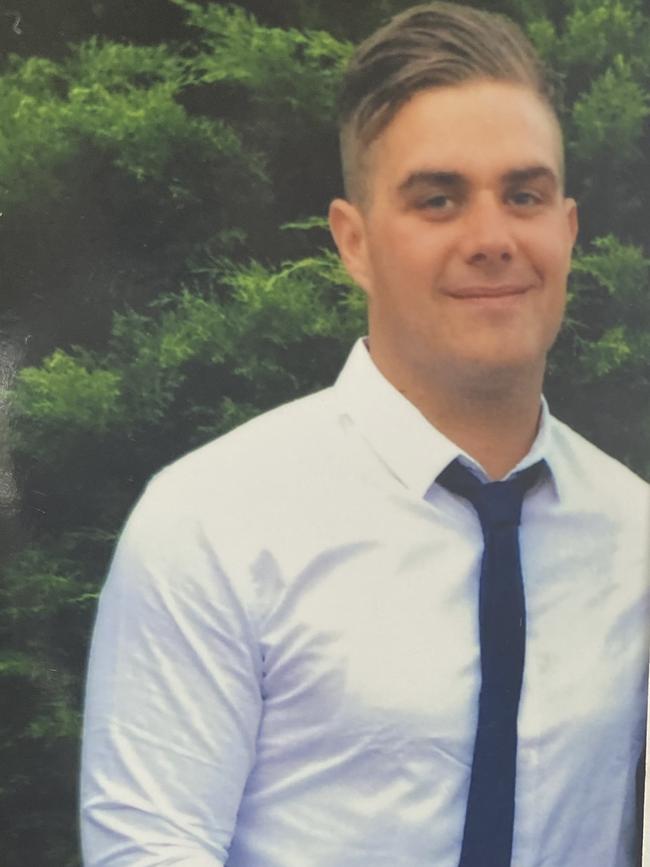Gerardine Eales describes the ripple effect of road trauma, six years after son Jackson was killed
Six years after Jackson Eales was killed in a Boxing Day car crash, his mum describes her ongoing trauma and hopes for an inquest to one day see changes she believes will save lives.

Geelong
Don't miss out on the headlines from Geelong. Followed categories will be added to My News.
Six years after Jackson Eales was killed in a Boxing Day car crash, his mum reveals her hopes for an inquest to one day see changes she believes will save lives. The Bell Post Hill mother speaks to HARRISON TIPPET about the inexorable trauma of losing a son on Victoria’s roads, and the changes she hopes might prevent other families from suffering the same heartbreak.
GERARDINE Eales often worries about her son being alone. Particularly at night.
In winter she worries he is too cold, and in summer that he is too hot.
She worries so much that she will sometimes drive to the Lara cemetery at night, to sit by Jackson’s grave.
“Just the thought of him being alone at night in the cemetery is horrendous, so I go and sit in the cemetery at night so he’s not alone,” Ms Eales says, as her tears soak through another crumpled tissue.
“I don’t do it as regularly as I used to. It used to be a very regular occurrence. Some days you just need to be there so you know he’s not alone.
“I still don’t like him being alone, or cold, or hot. They’re silly things, but I think if you talk to a mother she will understand.”

Jackson was big in almost every way. The 27-year-old scaffolder had a big personality and even bigger heart, according to those that had the good fortune of knowing him. Hundreds attended his funeral, and more and more children are named after him every year.
“He was obscenely well-liked,” Ms Eales gladly boasts. “He was loud, not necessarily politically correct at times, but he just had this loveable personality about him. Just very, very likeable.”
“Six-hundred people turned up to his funeral, what does that say? And seven little ones have been named after him.”
It’s almost exactly six years since Jackson was killed by a fuel tanker driven by Gerard Voss, who failed to stop at the intersection of Broderick and Heales Rd in Lara and smashed through Jackson’s ute about 4.30pm on Boxing Day, 2016.
Mr Voss faced criminal proceedings after the crash, pleading not guilty to charges including culpable or dangerous driving causing death and serious injury, negligently causing serious injury and failing to stop at a stop sign.
During the trial it was heard Mr Voss had suffered a heart attack on the day of the crash, but it was disputed whether the attack occurred before or after the crash. It was also alleged Mr Voss had misled his employer and VicRoads by not disclosing a heart condition diagnosed a decade earlier.
But in 2019 a judge placed a permanent stay on criminal proceedings for the truck driver – effectively granting him immunity from prosecution for the crash – after it was ruled that a properly instructed jury would be unable to exclude the possibility Mr Voss had succumbed to an undiagnosed sleep disorder when he failed to stop at the intersection.
The decision devastated Ms Eales and her family.
But they hope an inquest may one day provide some clarity on the many unanswered questions they still have, and also help to ensure fewer deaths on Victoria’s roads
“We just want a voice,” a resolute Ms Eales says.
GERARDINE Eales is describing her trauma – and her family’s hope for an inquest – from the couch of her Bell Post Hill home.
The intermittent murmur of passing traffic floats through the front door while her poodle-cross Buddy chews on a pink-frosted doughnut toy as she distractedly scratches his neck, the squeaks of the fake pastry punctuating Ms Eales’ heartbreak.
“The trauma my family has been through has been horrendous. Absolutely horrendous,” she says. “And we’re still going through it.”

“We can’t escape from this, it’s there in the morning and it’s there at night … it doesn’t go away.
“I think what happens is you all just act better. You all put on masks a little bit better. You go about your lives again, but you always carry it with you.
“People say you can get accustomed to it. I had a birthday recently and we went out and celebrated, but there was an empty chair there.
“There’s always an empty chair.”
Jackson’s brother and three sisters have also been left to manage acute trauma of their own following his death. So, too, has a broad network of family and friends, all of whom are also left to live with their loss as best they can.
The impact on Ms Eales’ grandchildren might sting the most, she says. Her youngest granddaughter was denied the opportunity to ever have Jackson in her life
“My eldest grandchild was nine, and the youngest at the time was five,” she says. “Santa came, and the next day their uncle they were having a water fight with the day before was dead.”
“How do you explain that to a five and a nine-year-old? That he’s not coming back?
“That’s trauma children shouldn’t have to go through, and it changed them. It changed their whole childhood.”
For three years after Jackson’s death, Ms Eales could not work, and she was ultimately diagnosed with major depression and post-traumatic stress disorder. Her mental health struggles further compounded both her own and her family’s trauma.
“I couldn’t be there for my other kids, because I was just this functioning person who people would say ‘oh she’s doing really well’, but I was just dying, absolutely dying inside,” she says, as her voice breaks.
“So my kids lost me, my grandchildren lost me, and I can’t get those years back.
“That’s the hard thing, not only had they lost their brother, they lost their mother as well.”
THE ripple effect of road trauma is impossible to measure. For every death and major injury on Victoria’s roads there are countless relatives, friends, witnesses and first responders who will experience lasting trauma of their own.
In the almost six years since Jackson’s death, 54 people have died on Geelong’s roads while more than 2100 have been hospitalised.
It’s an average of almost 10 serious road injuries each week, and close to one fatality every month.

And for each severe injury and death, the ripples of road trauma spread further across the region.
“I think what really, really sh--s me is the complacency we have about road death,” Ms Eales says, quickly apologising for the profanity escaping her lips.
“Why are we so complacent with road death? When you get in a vehicle it’s actually a weapon.
“I don’t know anybody that doesn’t know somebody killed in a car accident.
“My kids went to a little school over in Hamlyn Heights that only had 120 kids, and in the last eight years I’ve lost my son, our family friends lost their son Drew Kowalski and a mother Heather Aranyosi has also been lost as well to road trauma. Three from the school in eight years.”
Transport Accident Commission (TAC) chief executive Joe Calafiore said the organisation, which provides support and compensation to help people recover from road trauma, was acutely aware of this ripple effect.
“Every day at the TAC we see the devastating impact of road trauma, particularly on the loved ones left behind and people whose lives are forever changed due to injuries,” Mr Calafiore said.
“One life lost on our roads is one too many, families are never the same and the ripple effects of a tragedy are felt far and wide throughout communities – it’s so important that we consider what’s at stake and make safe choices on the roads.”
In 2021-22 the TAC paid $1.54bn in benefits to support more than 43,000 Victorians through post-accident recovery. The numbers are so vast they are difficult to comprehend – $420,000 to 118 people every single day, on average.
The state government body also funds the Amber Community, providing free counselling services for Victorians impacted by road trauma.
Ms Eales volunteers with the Amber Community, regularly speaking to offenders about her own trauma in a bid to ensure they aren’t one day responsible for a death on the road.
“When I do the seminars I sometimes cry, well, most times I cry” she says.
“But, you let it out. And the one thing I push at the seminars is they’ve got their second chance. They’re all offenders, but I really wish them well, because they’ve got a chance to make a difference.
“The seminars have been good for me. They’re terribly difficult but they’re good for me, because I like to think it’s Jackson’s legacy.”
WHILE the Eales family must forever carry the weight of their trauma, they remain hopeful there may one day be an inquest into Jackson’s death, which may help prevent other families from experiencing the same pain.
Ms Eales understands the chances of seeing an inquest are typically slim, but she says the family is willing to face their trauma if it might help others avoid finding themselves in a similar situation.
“I’m happy to open the wounds, and I think my children are the same,” Ms Eales says.
“There will be no win in this, because whatever happens Jack’s dead.
“But we want a voice, a voice for Jack.”
More Coverage
Originally published as Gerardine Eales describes the ripple effect of road trauma, six years after son Jackson was killed




